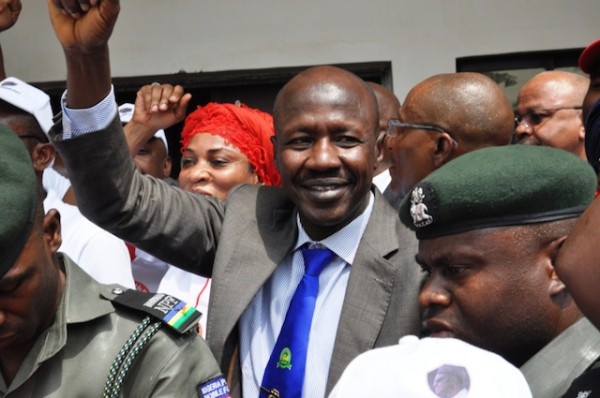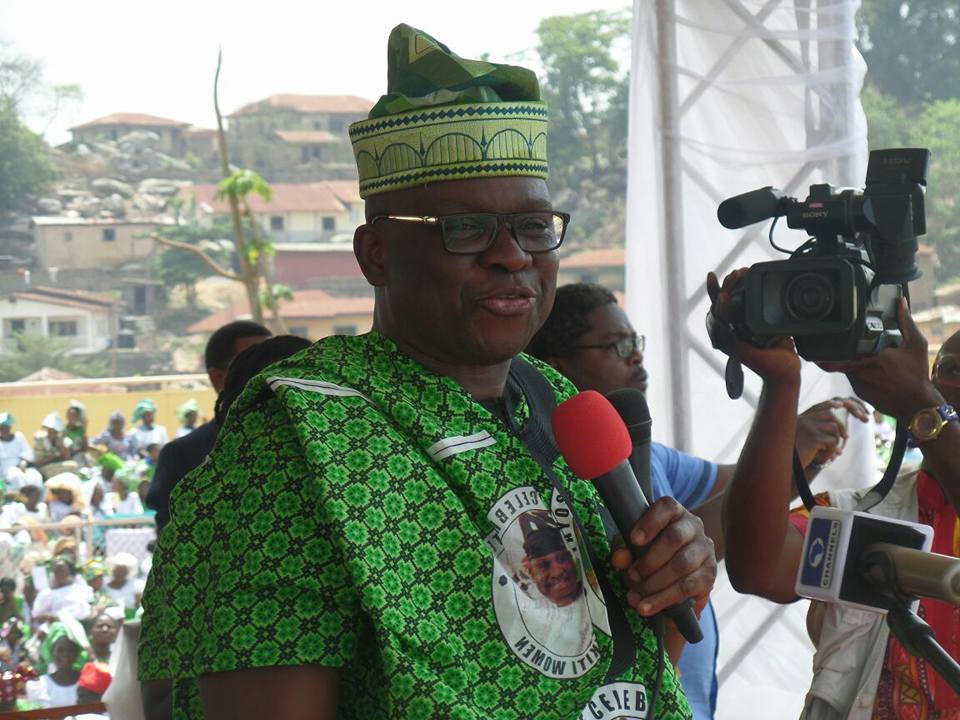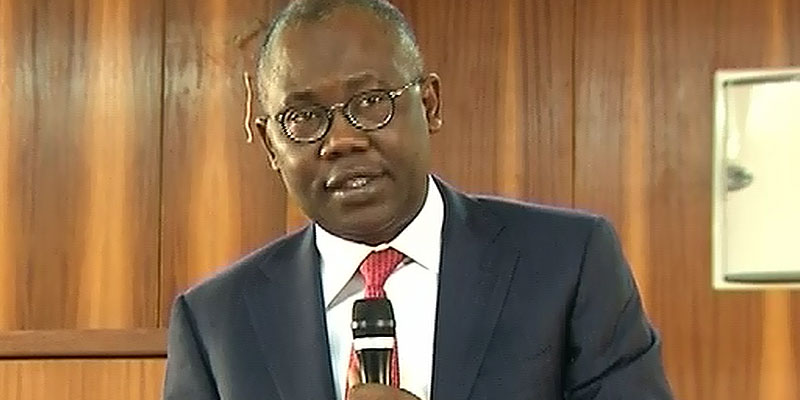Let me start this discussion by making this declaration upfront: I have a soft spot for Mr. Ibrahim Magu, the acting chairman of the Economic and Financial Crimes Commission (EFCC). And I want him confirmed as the substantive chairman of the anti-graft agency. I admit that he did not perform brilliantly at the senate confirmation hearing — in fact, I was slightly embarrassed by his outing. But one thing I have experienced in life, more so now that I am an employer of labour, is that there are applicants who don’t do well at interviews but can do a damn good job. There are those who speak smooth English at the recruitment stage and that is all they have to offer.
I have followed the career of Magu at the EFCC for a dozen years and I can confirm that he is one of the best hands the police force can boast of. An accountant by training and a seasoned financial crimes investigator, Magu was one EFCC official that many former governors prayed to avoid when the agency was looking into their books after their tenures expired in 2007. Anytime they were invited by the EFCC, they would plead not to be assigned to Magu for interrogation. He investigated the “big guys” without a fear in the world. He earned my thumbs-up when his investigation led to the conviction of his brother-in-law. This is a not a common story in our Nigeria.
Much as I like Magu, though, I still have my own headache about EFCC under his watch. I’m worried by the way the agency has been losing high-profile cases in court recently. In just one week, they were floored four times. This is certainly not a badge of honour on the chest of a government that is branded locally and internationally as fighting corruption. You are not fighting corruption if your only success is to lynch people in public or to declare them guilty even before their case files are prepared. The lynching will attract standing ovation, apparently, but in the eye of the law, there is no corruption until proven in court. That is a big problem.
If I were in a position to advise Magu, there are only three suggestions I would make to him on how to make the anti-graft war a remarkable success and a model for other corruption-infested countries. One, cut out the media circus while investigation is still on. Two, get “ogbologbo” lawyers to prosecute these cases — as suggested by former President Olusegun Obasanjo, who himself is an “ogbologbo” character. Three, let the war know no friend or foe. If after doing these things, the EFCC is still losing high-profile cases, then I will join in screaming that “corruption is fighting back”. For now, it is haphazardness, not corruption, that is fighting back.
Advertisement
Let me explain myself for the sake of clarity. One, I think there is too much of EFCC investigations on the pages of newspapers. I am not an expert in criminal investigations by any stretch of the imagination, but at least I see things in foreign movies, and I would say the media arm of EFCC is too active when the agency is investigating or intending to investigate people. Although Nigerians, especially on the social media, love the art of “naming and shaming” even before any case of wrong-doing is established, there is the danger of giving room to the suspects to undermine investigation and sabotage trial. It could be counterproductive.
Meanwhile, the reputations of many Nigerians have been damaged simply because they were invited by the EFCC. Interrogations are reported virtually live in the media. Yet, the fact that you were quizzed by the EFCC does not mean you have committed a crime. So many people have been quizzed and released with no case established against them. But because of the publicity blitz, their names are all over the internet being sensationally branded as criminals. This reputational damage aside, media trial can even win the accused some sympathy from sections of the public and the judiciary who would say it is “persecution” and not “prosecution”.
Investigations must be discreet. I have an example to give. The FBI recently investigated FIFA officials over corruption allegations that, in some instances, went back to 20 years. The investigation was not leaked to the media. It was when water-tight cases had been established and the case files were ready for trial that it was leaked. The suspects were immediately arrested. It is going to be difficult for the US government to lose those cases. Compare to Nigeria where you will first be arrested before the search for evidence begins. All your statements will be leaked to the media while you are still in custody. Something is just not right with this approach.
Advertisement
I understand very well with EFCC, and I indeed sympathise with them, that without the media spotlight, Nigerians would not believe that they are working. They are under pressure. There is actually a psychological advantage the media show confers. It is very good for the “optics”. But winning a case in the court of public opinion is not the same as winning in a court of law. In an organised society, the court is the arbiter, not the media. Processes and procedures are as important as the aims and the objectives. What we ultimately need to achieve is to build enduring systems and institutions that will effectively and efficiently tackle impunity in the country.
To be sure, media trial was not invented by Magu. It was the standard practice under Nuhu Ribadu as chairman. It does not address the corruption problems as much as we think. In fact, as we saw under President Goodluck Jonathan, an application of biometrics can reform processes and cut out certain forms of corruption from the root. But EFCC still has to clean up much of the mess that cannot be eradicated by BVN, TSA and payroll biometrics introduced by the previous administration. It is in cleaning this mess that the EFCC has to be very strategic. Certain things are beyond EFCC’s control, but they must diligently work with what they have power over in order to achieve results.
There was a time in my life when I supported media trials. As far as I was concerned, since convictions in court were getting difficult to come by, naming and shaming would serve as a second option. Having seen how things have turned out in the last 14 years, though, I have abandoned my endorsement of media trial. It can never be a substitute for proper investigation and diligent prosecution to secure landmark convictions. It is after proper investigations have been done that “ogbologbo” lawyers will come in. There are loopholes usually exploited by the counsel to the accused that “ogbologbo” lawyers can plug before trial begins.
You see, EFCC should never go to court under the presumption that a judge will convict a suspect on the basis of weak evidence — just to be seen as helping the government in the anti-graft war and to avoid being accused of helping corruption to fight back. Normally, every judge wants to give a sound judgment so that it is not upturned by a superior court. That is professional pride. Sure, I know Nigerian judges are a part of the problem. I know that corrupt persons have enough money to bribe the most decent of judges and hire the best of lawyers. This is beyond EFCC’s control. But, come on, let us prepare a damn good case first before concluding that corruption is fighting back.
Advertisement
Finally, the anti-graft war will be more credible, sustainable and effective if it not does distinguish between the friends and enemies of the government. One of the biggest failings of the anti-graft war in Nigeria has always been that you can predict who would be prosecuted and who would not. It is a pattern. Unfortunately, that is one of the surest ways of undermining the war. More so, people will easily figure out what camp to belong in order to be shielded from EFCC. I have seen this over and over again in 17 years. The war must be prosecuted in a way that nobody will feel immune — no matter who they are and where they belong.
My conclusion is that Magu is still the man for the job. I am not suggesting that he is the only one who can head the EFCC. I am not that daft. I have just discussed the weak points, even if they were not all his making. But I am also intelligent enough to know that we are never going to get a perfect head for EFCC. Whoever is brought in to replace Magu will have his or her own failings. However, Magu has, over the years, demonstrated courage, dedication and tenacity of purpose. He has the fear factor. I would only advise him to review his methods and tactics in order to do a much better job. But I am totally against throwing the baby away with the bath water.
AND FOUR OTHER THINGS…
HAUL OF SHAME
And so, $43.4 million, £27,800 and N23.2 million were discovered in an Ikoyi flat and the federal government is yet to make a pronouncement on the haul many days after? The biggest enemy of the Buhari administration is not the PDP — it is clearly its own amateurish way of doing things. It can’t even communicate with Nigerians. If indeed the money belongs to the National Intelligence Agency (NIA) as widely reported, do we need FBI to come and investigate before the information is officially made public? We are now left with just conjectures and speculations, and the average person on the street is concluding that there is a huge cover-up. Damaging.
Advertisement
YARI VISITS ZAMFARA
Praise God! I was delighted on Wednesday when God’s minister of crime and punishment, Alhaji Abdul’aziz Abubakar Yari, finally left Abuja to pay a courtesy call on Zamfara state, where he is, according to media reports, the elected governor. Yari went to inspect the extent of God’s punishment on his people who have been dying of cholera and meningitis after too much fornication. From the look on his face, Yari seemed satisfied with the damages. Since his people are obviously too sick to fornicate now, Yari should seize this opportunity to provide them with potable water and stock the hospitals with drugs to prevent further punishment from God. Cheers.
Advertisement
CHIBOK CHARADE
On the night of April 14, 2014, Boko Haram abducted 276 Chibok schoolgirls. We were first told by the military that the girls had returned. Then we started hearing that no schoolgirl was abducted at all. Someone sent me an SMS asking: “When did northerners start studying science that 276 of them would be preparing to write Physics exam?” Another asked how many buses would be needed to convey 276 girls. Politicians were busy fighting and trading blame. Mrs Patience Jonathan added drama with her classic “Na Only You Waka Come” tirade. Some girls escaped. Some were released. But three years after, 195 are still missing. Truth be told, Nigeria let them down. Shame.
Advertisement
LIGHT HEARTED
Alhaji Lai Mohammed, information minister, had his own “alternative facts” moment on Wednesday when he made light of President Muhammadu Buhari’s absence at the weekly cabinet meeting. He said it was because “the agenda was light” and Buhari had to attend to more important matters. For the record, that was the first time in the history of Nigeria (let me say: to the best of my knowledge) that a president would be in town and not preside over a cabinet meeting. We all know that the president is recuperating and we are praying for him, so we did not need any spin for goodness sake. How can agenda be “light” in a country that has no light? Seriously?
Advertisement







